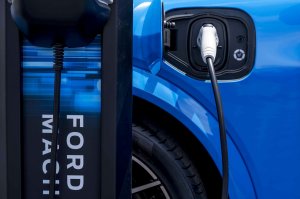Jan. 19 (UPI) — The Biden administration on Friday announced new actions to expand ownership electric vehicles, make it cheaper for people to install EV chargers at home, and accelerate the expansion of EV chargers on America’s highways.
As part of the initiative, the government will invest $325 million into three programs to improve public EV charging stations, enhance EV technology, and help train workers to deploy and maintain the emerging charging network across the country, the White House said in a statement.
Additionally, the government is investing more than $46 million in a program called Ride and Drive Electric to strengthen the EV charging industry.
Part of the funding announced on Friday will be used to fix broken charging stations and to reduce individual costs for accessories like home chargers and batteries.
But the major aim of the initiative is to boost the presence of clean-running vehicles and chargers as the administration faces pressure to meet international climate goals.
Under the plan, the Treasury Department will put forth new regulations to ensure the EV charging tax credit, provided through the Inflation Reduction Act, is accessible to more than two-thirds of Americans.
At the same time, the Energy Department will release a mapping tool to help people check if they qualify for the tax credit.
The credit offers up to 30% off the cost of an EV charger, which typically ranges from a few hundred to a couple of thousand dollars for an at-home system.
The credit is intended to benefit individuals and businesses in low-income and rural areas, aiming to make EV charging more accessible in underserved communities, the White House said.
The incentive is also expected to make the installation of chargers at homes and work sites more affordable, and help fill the gaps in the national charging network.
The latest EV investment comes on the heels of numerous actions by the administration to boost the appeal of EVs, including $623 million in government awards announced last week to deploy public chargers in a number of U.S. cities.
In October, the administration announced tax credits that allow customers to apply a rebate at the dealership when purchasing an electric vehicle.
Some of the funding will support initiatives like Oregon Tradeswomen, Inc., which is assembling a diverse workforce for electrical apprenticeships to support the network.
Since taking office, President Joe Biden has emphasized electric vehicles as a key component to combating climate change, while Biden’s ongoing clean energy efforts had prompted $10 billion in EV investments from the private sector, the White House said.
EV sales have more than quadrupled since 2021, with more than 4.5 million new EVs on the road, leading to a thriving EV charging manufacturing sector, with more than 40 factories announced or opened in the last three years, according to the administration.
These facilities can produce more than a million chargers annually, including 60,000 fast chargers, highlighting the momentum of the broader EV effort.
EVs have become more affordable under Biden as prices have gone down more than 20% since a year ago, while the number of publicly available charging ports has increased by more than 70%, the White House said.
About 170,000 EV chargers have already been installed nationwide, putting the government on track to deploy 500,000 new chargers by 2026, four years sooner than Biden’s goal of 2030.
In April 2023, the administration proposed new pollution limits on tailpipe emissions as well as a requirement that more than half of new vehicles manufactured in the United States be fully electric by 2032.

COMMENTS
Please let us know if you're having issues with commenting.